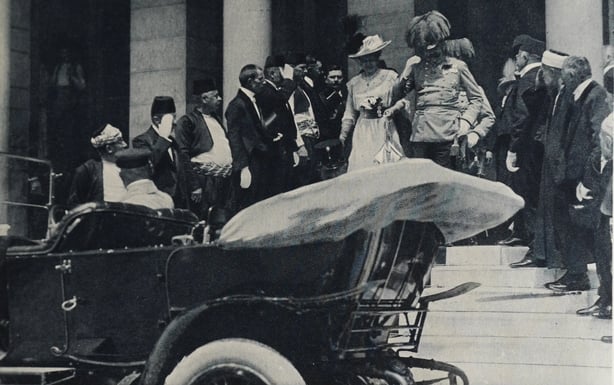
The summer maneuvers would bring him into the area and diplomacy would ordain a visit to Sarajevo on June 28th, St. 1 The Archduke was also Inspector General of the Austrian army. The heir to the Hapsburg throne, Archduke Franz Ferdinand, was in favor of giving an equal voice to the Slavs of the empire - a belief counter to the very core of the Serb cause. He was well respected throughout the empire and his heir's politics were even worse for Serbian cause than his own. Maybe an act of supreme defiance would convince Vienna otherwise maybe the dream of a greater Serbia could be realized by such an act.Īn assassination of Emperor Franz Josef was out of the question. Austria-Hungary, having officially annexed Turkish Bosnia-Herzogovina in 1908, was not about to let go of it. The Bosnian Serbs inhabiting the southern Austro-Hungarian provinces of Bosnia-Herzogovina wanted to be united with their brothers living across the Drina (Dunav) in Serbia proper. The Balkans of 1914 were a hotbed of nationalistic intrigue.
/arc-anglerfish-syd-prod-nzme.s3.amazonaws.com/public/VMAGE7RP6VDKJM2XVPV6SXHHXM.jpg)
He had hit the nail directly on the head. This was Bismarck's prophecy as to what would set off the seemingly unavoidable European war. "Some damn foolish thing in the Balkans," The Archduke and Sophie arriving in Sarajevo
#People who assassinated franz ferdinand trial#
Apis took the credit for the assassination, but it has been suggested that he did this to save himself when he finally lost his power struggle with the Serbian prime minister and was put on trial for treason, in 1917.Īlan Bardos is the author of The Assassins.Trenches on the Web - Timeline: Assassination in Sarajevo Tankosic was mortally wounded in 1915 and died without leaving any record of the events leading up to the assassination. Ultimately it is impossible to prove any of the theories. It is possible that he was trying to stop the assassination. Apis’s master spy, Rade Malobabic, was also sent to Sarajevo during the archduke’s visit and supposedly went to see Ilic. He spent the second half of June 1914 trying to persuade Gavrilo Princip not to carry out the assassination. It isn’t known for sure what they discussed, but Ilic began to express doubts about the assassination after the meeting. An envoy was sent to Bosnia who met Danilo Ilic the assassin’s fixer in mid-June 1914. Therefore rather than changing his mind about the assassination, Apis could have found out about a rogue operation and tried to stop it. Tankosic is even said to have disobeyed orders and initiated the First Balkan War in 1912.īy 1914 he was building a force of irregular partisans to infiltrate Austro-Hungarian territory and had given weapons to other would-be assassins.

Tankosic had a history of reckless behaviour and insubordination and Apis apparently described him as a ‘drunkard and a good for nothing’.

The last thing he wanted was to fight a war with the numerically superior Austro-Hungary.Ī strong case can be made that Tankosic helped the assassins without consulting Apis. At the time he was locked in a power struggle with his own government. Apis had little to gain by assassinating Franz Ferdinand. The version of events depicted in my novel The Assassins is an amalgam of the two theories.Ī new argument has been put forward by John Zametica in Folly and Malice: The Habsburg Empire, the Balkans and the Start of World War One, suggesting that Major Tankosic trained and armed the assassins on his own initiative, without the knowledge or permission of Apis. There is also some debate as to whether or not Apis tried to stop the assassination, when he’d had a chance to reconsider his decision. Lacking the means to carry out the assassination they went to Tankosic for help, he in turn asked permission from Apis who sanctioned the assassination on a whim. They also intended to spread fear amongst the ruling class and ignite a revolution that would ultimately unite the South Slav people into a Yugoslav state. The second theory is that the assassination was the idea of the assassins themselves who planned to assassinate Franz Ferdinand as an act of revenge for the suffering imposed on the South Slav people by their colonial rulers. The assassination was organised by his deputy Major Vojislav Tankosic who recruited the assassins, trained and armed them and provided safe passage to Sarajevo. The first is that it was ordered by Colonel ‘Apis’ Dimitrijevic, the head of Serbian Intelligence, to stop Austro-Hungarian interference in the Balkans and allow Serbian expansion. There are two basic schools of thought about the origins of the plot to assassinate Franz Ferdinand.


 0 kommentar(er)
0 kommentar(er)
